The Ghost Festival
Chinese Ghost Festival also called Hungry Ghost Festival, Zhongyuan Jie, Gui Jie, is a traditional festival which falls on the 14th night and the 15th day of the 7th lunar month. Ancient Chinese believed that 7th month in lunar calendar was ghost month, and the gates of hell would open from the first day and ghosts can freely roam on the earth for food and entertainment. And they would back to the hell on the 15th day.
For Chinese people, Ghost Festival is for assoiling and sacrificing the ghosts of the Hell. At that day, the dead would return to visit their living relatives. Tradition states that Family members offer prayers to their deceased relatives, burn joss sticks, paper money and offer food. Nowadays, Chinese people still celebrate Zhongyuan Jie, and burn paper houses, cars, servants and televisions to their dead relatives. It's one part of Chinese ghost culture.
It said that the offerings would reach the ghosts and help them to live comfortably in the afterlife. Almost as important as honoring the ancestors, offerings to ghosts without families must be made, so that they will not cause you any harm.
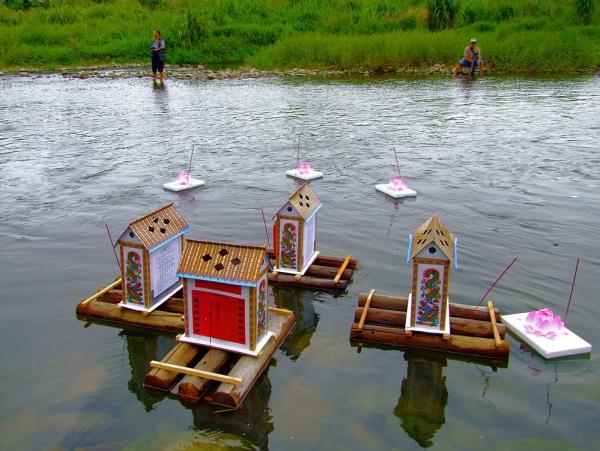
The Ghost Festival Basic Facts
- In Chinese: The Ghost Festival, Zhongyuan Festival, 中元节
- Other names: Ullambana Festival
- Date: the 14th night and the 15th day of the 7th lunar month
- Importance: It is the most important ancestor worship festival besides Tomb-sweeping Day
- History: 2000+
Date – When Do We Celebrate Chinese Ghost Festival in 2026:
| Year | Date | Day |
|---|---|---|
| 2026 | Aug 26 | Thursday |
| 2025 | Sep 6 | Saturday |
| 2024 | Aug 18 | Sunday |
| 2023 | Aug 30 | Wednesday |
Origin – A Filial Son Made the Ghost Festival Popular
Chinese Ghost Festival roots in the Buddhist festival of Ullambana, and also some from the Taoist culture. The meaning of Ullambana is an instrument used to save suffering from painfully hanging over, in other words, fillS a bowl with five fruits and offer to Buddha and monks to save suffering beings from hell.
It said there was an important disciple of Shakyamuni Buddha named Murata, who has very deep practice, known for his magical powers. But his mother did a lot of bad things and became a hungry ghost after she died. Murata knew this by his magical power, sadness haunted him, so he used magical power to feed his mother with foods and drinks. But he failed.
He cried and asked Shakyamuni Buddha for help. Shakyamuni Buddha told him that he need make offering to monks within a 10-mile radius with five kinds of fruits into the bowl, only for this, he could gather all their power so that he could help his mother get over the suffering. Murata did as Shakyamuni said, finally, his mother was free.
Afterwards, Buddhist and Taoist would hold ceremonies to relieve ghosts from suffering at afternoon or at night. Altars were built; rice and other foods were thrown into air in all directions for the ghost by the monks or priests.
China from the Liang Dynasty began to follow this line, along into the Hungry Ghost Festival. But later in addition to the set of lent for monks, they also increased confession, played fireworks and held other activities. Nowadays, the Ghost Festival had been listed into folk customs item category of National Intangible Cultural Heritage.
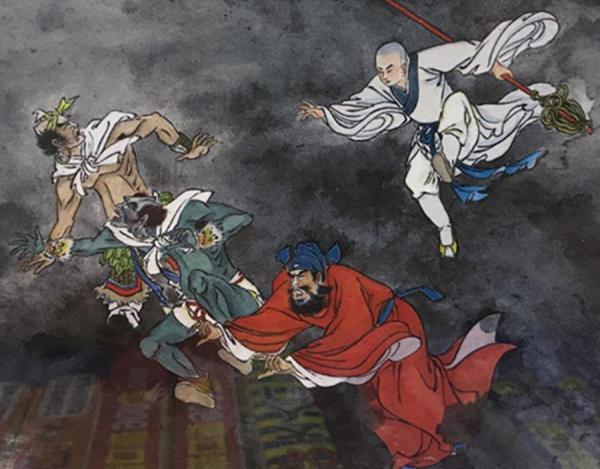
Difference – Chinese Ghost Festival vs. Halloween
No matter East or West, the fear and worship of ghosts have existed since ancient times.
In Chinese culture, "Ghost" is taboo, death is a taboo. People are not used to joking with "ghosts", nor are they used to living "ghosts". Chinese Ghost Festival culture is based on our continuous tradition of patriarchal clan and kinship, which is closely related to our tradition of pursuing the final destination, and highlights the memory of ancestors. Accordingly, the main purpose of our ghost is to accept people's sacrifice, rather than to find a replacement for regeneration. This belief constitutes the very different ghost culture in China and the West.
In Western countries, Halloween is a ghost festival widely celebrated. Even in order to increase the fun and interesting atmosphere of the festival, children are encouraged not to be afraid of ghosts since childhood. Even the old men and women, they may dress up as a "ghost" to play a spoof.
It’s said Halloween originated in 500 BC. When in Ireland, Scotland and other places, people believed that the spirit of the dead would return to the living place on October 31 this day, to find a living person, in order to obtain the opportunity of rebirth. Local residents worried about ghosts to take their lives, so when the arrival of October 31, they would put out all the lights, so that the ghost couldn’t find the living, at the same time, they would dress up as the appearance of ghosts and monsters, in order to frighten the ghost away. With the passage of time, the meaning of Halloween in the West has gradually become a funny festival.
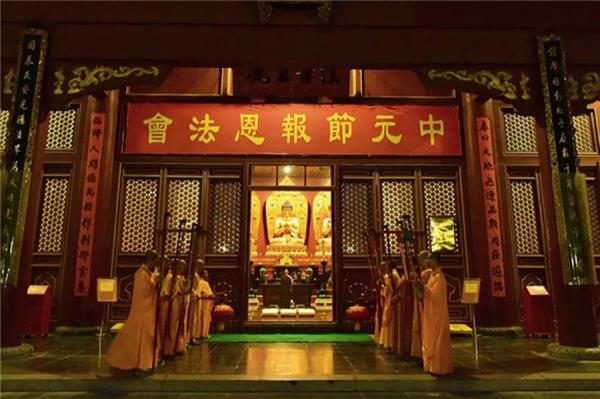
Traditional Activities – How to Celebrate Chinese Ghost Festival?
Sacrifice
Families would also offer food offerings, burning of underworld money and bags containing cloth for the visiting spirits of ancestors in the Ghost Festival. Kinds of meals would be served with empty seats left for deceased in the family. They also light the candles, but not the normal candle we use for lighting purpose. They are specially produced and color in red with some pattern or tattoo on the surface.
During evening, incense is burnt in front of the doors of each household for paying tribute to other wandering and homeless souls so that they won't bring misfortune and bad luck. Large offerings are also placed on the offering table to ward of bad luck. To make sure that all ghosts back to heaven, people would flew water lanterns on the river, which in shape of lotus or just a little paper boat.
Prayer ceremony
Most of temples or pagodas will hold a ceremony to release souls from purgatory.Starting at 23:00 on the first day of the seventh lunar month, each family in the temple jurisdiction lights their lamps and calls them "Pudu Lamps", for Pudu Master and good brothers guiding the direction, and enjoying incense.
Set off " Water Lamps"
It is a custom for Minnan people and Taiwanese to celebrate the Hungry Ghost Festival in the waters of the first discharge of lights. They share incense, known as "water lamp", to meet the arrival of the dead, and help the dead light the road. The purpose of the river lamp is to release water ghost and other ghosts. It is said that the road from hell to the sun is very dark, therefore one cannot see the way without a lamp. So this is a good thing.
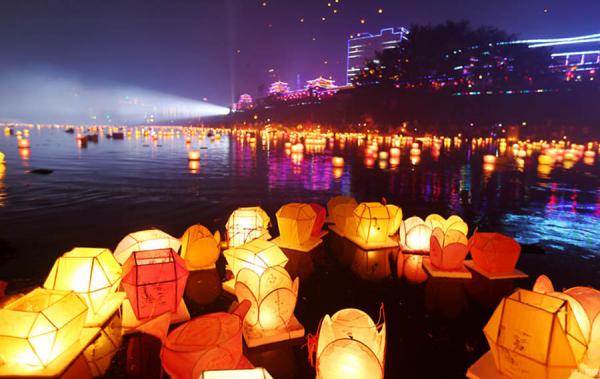
Taboos! Don’t Do These in at Chinese Ghost Festival!
Lucky Food for Chinese Ghost Festival
HuamoIn
Shanxi Province, steamed Huamo are chosen for the Ghost festival food. The shapes of the Huamo are different, young generations should eat the flat type Huamo, which means they hope that the children will not forget the upbringing of their elders, while those of the same generation should eat the fish-type Huamo, which means annual abundance, while the elders should eat the adult-type Huamo, which means full of offspring, longevity and happiness.
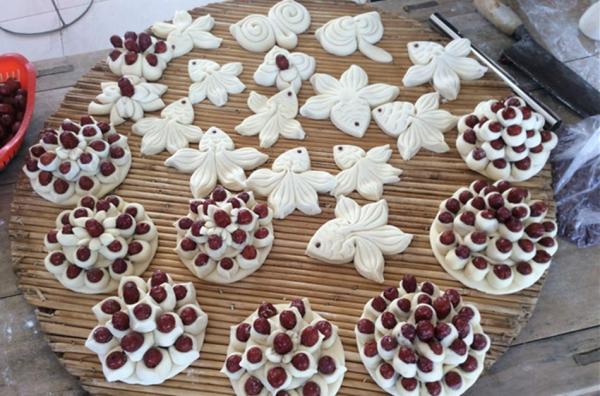
Ducks
In many places of China, people will eat ducks to ward off bad luck. The Chinese pronunciation of “duck”is “Ya”, it’s the same with the word “suppress”, so there was a sense of threatening and suppressing the ghost.
Steamed buns
Children eat steamed buns to have safe and peaceful life from fear.
Fengdu Ghost City
In China, there is a ghost city - Fengdu modeled after the Chinese Hell, built over 1,800 years ago. In Chinese culture, Fengdu is believed to be the resting place of the spirit of the dead. All people's ghosts, regardless of age and sex, will come to Fengdu after death. Today, Fengdu is a very popular shore excursion site for tourists on the Yangtze River. It offers a good chance to explore Chinese ghost culture.


